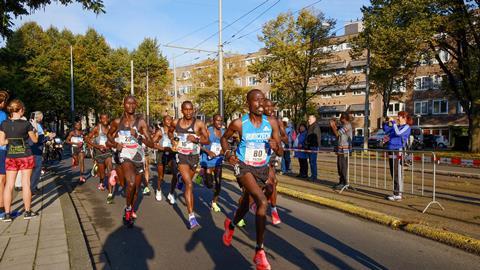Writing a dissertation is like the Amsterdam marathon but with fewer spectators, according to Eva Meeus.
On Friday, the 13th of October, I handed in my dissertation. For four years, I studied transition metal‑catalyzed reactions in water as a PhD student at the University of Amsterdam. Rather fundamental research, but with a clear goal: providing a lead for the development of innovative drugs. Indeed, only a lead. A PhD candidate’s research is just the tip of the iceberg. After all, science is a team effort to which everyone contributes. Besides that, PhD research is also something you mainly do for yourself. Partly for this reason, you often take for granted the long working days, short weekends, and many disappointments, and keep pushing hard at work.
Finally, all efforts come together in the last phase of the PhD track. In this phase, you write a dissertation. All the accumulated knowledge, discoveries, successes, but also failures, must be combined into one almighty PDF file that will be printed, after approval, in a nice booklet and must be defended in front of a promotion committee and your supervisors in a beautiful church with anyone who wants to attend. But that is of later concern. First, thousands of words must be put on paper, tables must be filled, and figures have to be made. Another period of long days and short weekends, soldiering on.
Character
To make this process somewhat understandable to family and friends who have nothing to do with research, I often use running a marathon as a metaphor. Hours of training, tight schedules, challenging yourself, and pushing yourself to the limit to finally finish those last few kilometres purely on character. That is how it feels to finish a dissertation after three and a half years of hard work. Skipping a beer or a party to be fit the following day seems reasonable in that light, right?
Coincidentally, the Saturday after I handed in my dissertation, the Amsterdam marathon took place. Like every year, I walked down the street to watch and encourage a few of the exhausted runners. And I was not alone. Every year, thousands of people loudly cheer and applaud for every participant who bravely runs on to reach their personal goal. Unlike other years, this scenario of spectators and runners made me think, in part because of a recent quote by historian Maarten van Rossem, which had been forwarded to me that same morning: ‘An athlete who wins a race is a hero; a young scientist who works very hard does not matter to anyone.’ Indeed, the number of people who had cheered me over the line while finishing my dissertation could be counted on one hand. And getting home on time after a party, was beyond their imagination.
Guesswork
The rest of the weekend, I could not stop thinking about this. I shared the topic with family, colleagues, and my supervisor over coffee on Monday morning. We all had the same thought: running a marathon is something visible, something sensible. It is easy to imagine the effort required to run a marathon, but it remains guesswork what finishing a dissertation actually entails, let alone the PhD research itself. The conclusion was quickly drawn: we should describe the process outlined above more often, with or without the Amsterdam marathon as a metaphor.
Eva Meeus was a PhD student in the Homogeneous, supramolecular and Bio-inspired Catalysis group lead by Joost Reek and Bas de Bruin at the University of Amsterdam.













Nog geen opmerkingen